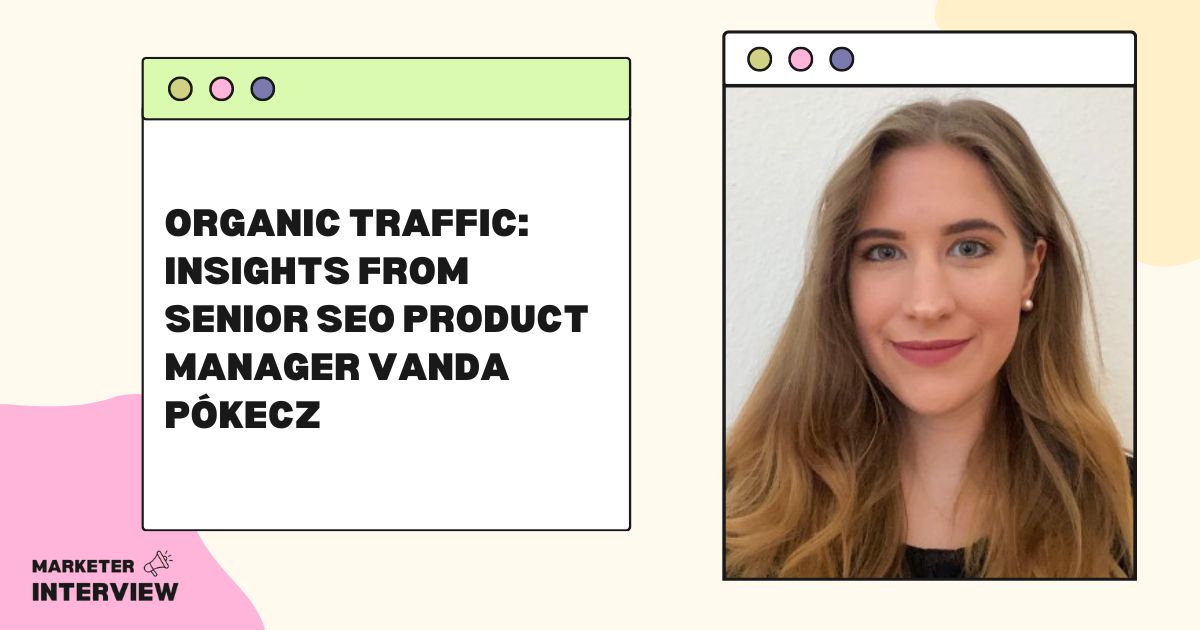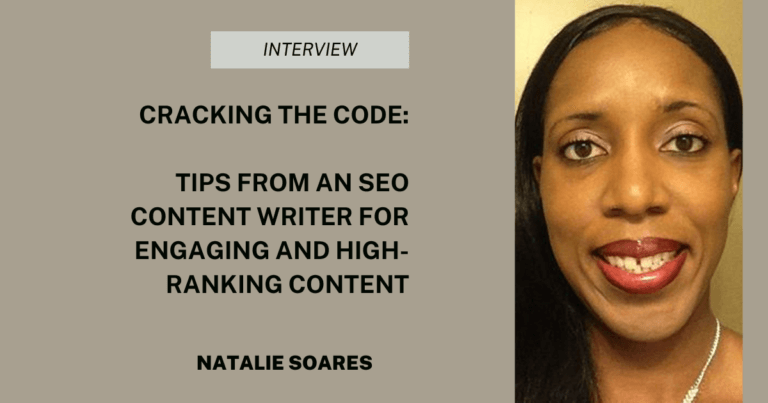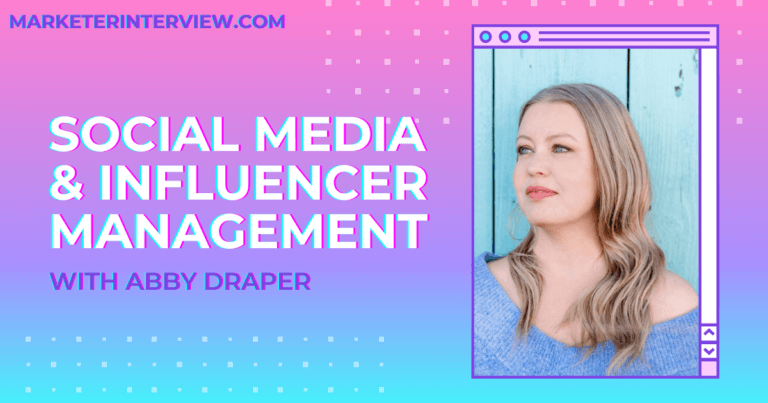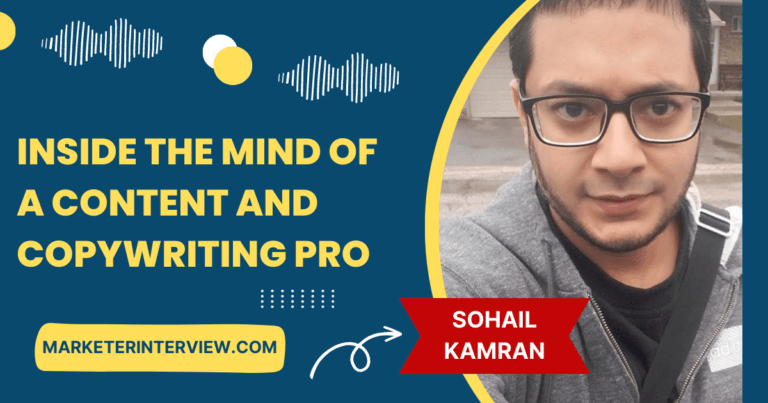Organic Traffic: Insights from Senior SEO Product Manager Vanda Pókecz
Welcome to Marketer Interview, where we talk to exciting marketers about their journey, career and expertise.
Today, we have the pleasure of speaking with Vanda Pókecz, a Senior SEO Product Manager with a wealth of international experience in e-commerce.
Vanda has spoken at prestigious events like SMX München and Brighton SEO and is passionate about delivering high-quality organic traffic through a user-centric, product-focused approach.
In this interview, we’ll discuss Vanda’s journey into marketing and her insights into the world of SEO and product management.
Contents
- 1 Can you tell us about your marketing journey and how you became a Senior SEO Product Manager?
- 2 How do you develop an SEO strategy for a new product or website?
- 3 Can you share some insights into your experience with on-page, off-page, and technical SEO topics such as crawling indexation and internal linking?
- 4 What is the most critical factor in achieving high-quality organic traffic?
- 5 How do you measure the success of your SEO campaigns?
- 6 Can you talk about your involvement with the Experimentation Taskforce and how it has impacted your approach to SEO?
- 7 As a Senior SEO Product Manager, how do you collaborate with other teams, such as product, engineering, and content, to achieve your goals?
- 8 How do you stay up-to-date with the latest trends and best practices in SEO and product management?
- 9 Please walk us through the daily tools and software you use to manage your work as an SEO Product Manager.
- 10 What advice do you have for aspiring SEO professionals or product managers?
Can you tell us about your marketing journey and how you became a Senior SEO Product Manager?
One milestone along this journey was my study abroad year in Cologne, Germany, as part of my International Business BSc. You will soon understand why.
The second milestone was realizing that though I like marketing, traditional marketing differs from where I see myself. Digital is the future. This is why I completed my MSc in Digital Marketing, where I got my first taste of SEO through a module and client work.
SEO is quite rare in formal education. Interestingly at this stage, out of all the areas of digital marketing, SEO was the one that I liked the least, and I definitely would have preferred not to work in it.
This is where Germany came back into the picture. Due to the preference to keep my German language skills, I decided to leave Dublin and move to Berlin. Of course, the ideal job, which ticked all the other boxes (in Berlin, English-speaking with Hungarian language knowledge), was an SEO job.
I started my career as a Junior SEO and Outreach Manager at Ladenzeile GmbH. This was an exciting time in my career and life, and soon I learned to love SEO, mainly because during my time with Ladenzeile, many changes kept me on my feet.
As mentioned, I started with a PR focus but was soon able to move into more technical and analytical topics thanks to the size of the platform. In addition, due to my eagerness to learn and participate in cross-departmental tasks and projects, I quickly progressed with increasing responsibilities.
The product focus came into the picture around 1.5 years ago when my current lead, Björn Darko (Head of Product and SEO and host of the SEOPRESSO Podcast), started at the company.
My team soon moved to the Product and Engineering department instead of sitting in Marketing. This is when we truly started listening to our users instead of the strongest focus being placed on optimizing for the search engine. But, again, this is something I love and definitely, something more in line with the current needs of the industry.
Another thing close to my heart is the opportunity to work closely with developers. I spent four months in 2022 as interim Product Owner of our Frontend team, which taught me a lot of valuable skills that I could bring back to my SEO PM role and ultimately contributed to my promotion to Senior SEO Product Manager.
How do you develop an SEO strategy for a new product or website?
First, it is essential to understand the status quo and issues faced by the platform or user problems we are trying to solve. When you are new to a website, you will likely start with a benchmarking and complete audit.
I also did this in the past. However, it is a bit different for me at Ladenzeile since I am familiar with the platform and instead follow a continuous monitoring approach rather than sitewide audits.
So far, I worked with the OKR framework for implementing and executing strategy, and though it was generally working fine, it was not the best fit for SEO.
I was glad we changed to a company-wide strategic roadmap approach since this allows us to think in less restrictive timeframes and provides the whole organization with a shared understanding of priorities. In addition, since we moved to the product area, the SEO team also has its team roadmap, which we use for strategic projects and more significant operational initiatives.
When setting up the roadmap, we usually start with team brainstorming sessions. Ideas can come from, e.g., market/competitor research, or since we became SEO PMs, some ideas come from learnings from the product discovery process.
Ideally, this will be more often the case in the future since we aim for continuous product discovery, which means more user insights. Our ideas usually span from on-page to tech-SEO initiatives, while the off-page actions have been moved to our content department with support from SEO if needed.
The most important thing when setting up a strategy for a new product is to ensure it is solving a problem, to identify the goal you want to achieve, and the KPIs you will use to measure success.
If it is a more extensive project, it is also essential to have a set team, if needed cross-departmental, with people who will help in the execution. This removes uncertainty regarding resources for execution.
You can have the best SEO strategy but will not reach your goals if you cannot get the buy-in and resources you need. I’m sure most SEOs understand this very well.
When I started my career, my main focus was on off-page and some on-page optimization for Ladenzeile’s Hungarian platform shopalike.hu.
Our main off-page tactic at the time was to ensure that we had a healthy backlink profile. For this reason, we approached this topic by creating high-value evergreen or seasonal & country-relevant content before seeding them to potential publishers. Since then, this task has moved to our Content team, who approaches this with a clearer PR focus.
Around 2019-2020 I started focusing on more technical, i.e., indexation and crawling topics. The technical SEO topics are exciting at Ladenzeile since, as a comparison platform focusing on different verticals, we have much to offer our users, which also means many URLs.
Of course, we need to ensure that crawlers can find our most valuable pages, and hence users can find us on the SERP when we can serve their intent. So without revealing too much, we have a neat, automated system that allows us to keep healthy control over the URLs we’d like search engines to index.
I am co-driving a project with our Tech SEO Analyst to ensure we continue to keep this control.
Internal linking and CTR improvement-related projects are also on my team’s radar.
Due to the size of our platform, we avoid too much manual work, though occasionally, it is necessary.
Primarily we aim to work with our dev teams to ensure that we can build sound logic, allowing us to have automated solutions. This is true for most of our actions since managing such a large platform without automation would be impossible.
What is the most critical factor in achieving high-quality organic traffic?
Firstly it is essential to understand what high-quality organic traffic means for us. There may be a difference between platforms that serve informational and transactional intent.
When it comes to e-commerce, where your platform may be vast and complex, to achieve high-quality organic traffic, you need to have control over your platform that allows you to provide only quality content to search engines and, ultimately, the user.
For example, we need to avoid keyword cannibalization, but improving page speed is also essential, as we don’t want to lose customers before they even get to know our product.
Ultimately, understanding our users is the most critical factor in achieving high-quality organic traffic. Ideally, we should have a transparent target market and positioning and do our best to understand the users.
By knowing who we want to reach, we can adapt our strategy and actions to improve our chances of reaching them. Serving everyone will not work.
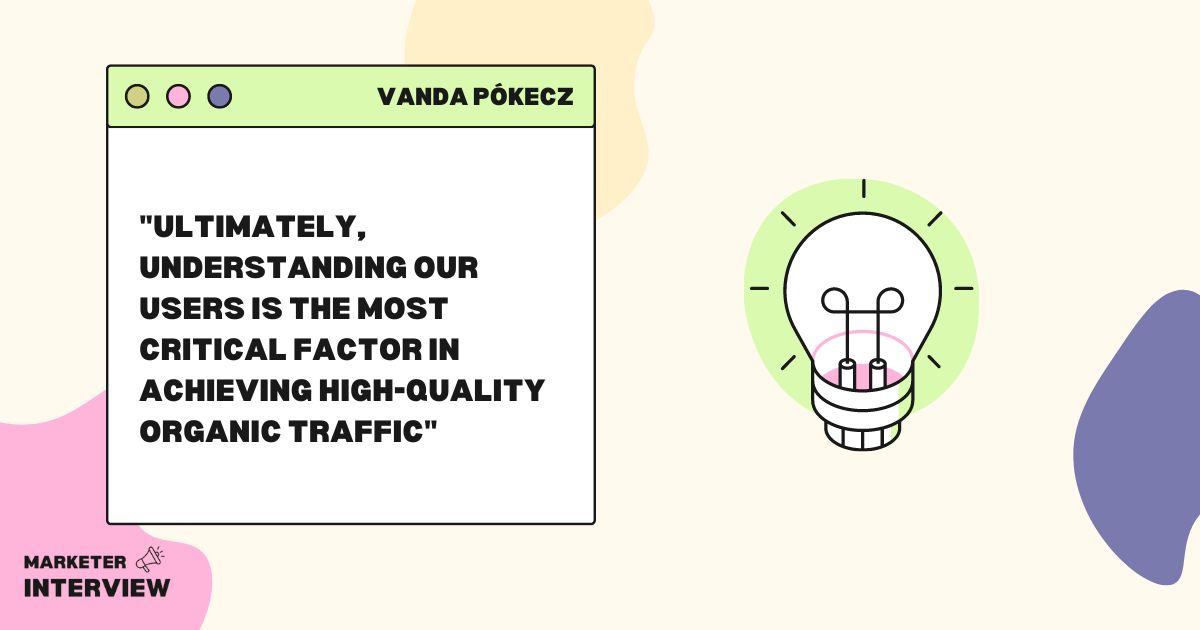
How do you measure the success of your SEO campaigns?
Establishing how success will be measured at the early stages of a product work/campaign is essential.
Firstly, to know what we want to achieve, we need to understand the problem to solve. Only once we have our problem statement nailed down can we start thinking about the goal or objective. Once we have that, we can consider the metrics / KPIs that best measure the success of reaching the goal.
Which KPIs we choose are quite project dependent. Usually, success is not measured by only one metric but by a combination where we have a primary metric and multiple secondary metrics. This can especially be the case when we are testing.
Occasionally we even realize that the change proposed impacts the secondary metrics more significantly than the primary one. In such cases, we take a step back to check whether the problem definition needs to be adjusted slightly and hence also the primary metric.
Of course, we regularly track things like sessions, CTR, ranking changes, bounce rate, and even visibility scores. However, ultimately business KPIs like revenue are also important, if not the most important in some cases.
Tracking of the metrics should be set up already before the changes are rolled out. Even if everything is done to plan, it can sometimes take time to measure the success of SEO campaigns.
There is a common understanding or myth that it takes around six months to see the impact of SEO work, and as we know, a lot can happen beyond our control in six months, which may impact the outcome.
Nevertheless, a good plan is half of the work done, so align early on how you will measure the success of your SEO campaigns.
Can you talk about your involvement with the Experimentation Taskforce and how it has impacted your approach to SEO?
I have a special place in my heart for cross-departmental effort, as it encourages learning and an overall team feeling within an organization.
Therefore, when the opportunity presented itself to join Ladenzeile’s Experimentation Taskforce, I was more than happy to do so. This was before we shifted to a product-led SEO approach, so it was especially attractive for me that I could take part in user research and experimentation topics.
This effort is driven by our Growth team, which is mainly made up of highly inspirational women. This was also a driving force for joining.
Initially, I was involved in more of an SEO representative role but later became a core member driving experiments. I am also responsible for prepping and moderating our learning sessions, where we share the process and outcomes of our experiments with interested colleagues.
In addition to split testing in the task force, we are also focused on carrying out user surveys and interviews. The experience I gathered that I have been able to transfer to my SEO projects, especially since becoming an SEO Product Manager, a sizable new focus of my work is product discovery and truly understanding user problems.
In general, we have a very well-structured way of working in the Experimentation Taskforce, following similar formats for definitions and having templates to guide us. I often reach for these when my projects include experimentation.
Not only because in Ladenzeile, we try to centralize the overview of most experimentation in the task force but because I need to see a point in deviating from a system that works and that I contributed to building. Despite this, of course, I am always open to improvement suggestions.
As a Senior SEO Product Manager, how do you collaborate with other teams, such as product, engineering, and content, to achieve your goals?
As mentioned, we are working with a company-wide strategic roadmap, which does make work easier once the alignment is done. Nevertheless, even if we have a common understanding of goals, collaboration in action can be tricky.
Collaborating with Product is convenient since my team sits in the product and engineering department, and SEO PMs, including myself, work closely with three Product Owners.
We have daily standups together, which encourages continuous communication. Beyond these, we occasionally have workshops and retrospectives to discuss team dynamics, responsibilities, and working together as a larger team. With POs beyond my area, I communicate on a project basis if their input is needed.
Of course, a ticket to the relevant team is often the best starting point, and that is what I, as SEO PM, also expect from other teams, especially when it comes to more operational SEO tasks.
SEO working on another team’s initiative is less likely without a ticket to start the conversation. However, the relevant stakeholder can expect to hear back once a ticket is there, the latest after our next refinement.
It can get trickier with engineers, as how closely I, as an SEO PM, can get to them depends on the relationship we built and the PO’s preference.
Luckily during my time as interim PO, I was able to build a great relationship with devs. Hence, I often allow myself to reach out to them directly with questions, though I often prefer to respect the PO’s role and instead go through them first.
One thing I learned, as interim PO, is that engineers often like to be involved in the conversation and listened to earlier rather than later; therefore, when I am driving a more complex project, I do like to include engineers in early workshops too, e.g., for a design sprint.
I prefer to consult with some other teams, e.g., content, providing best practices, or data-based suggestions. Since my team moved to the product area, we even handed some previous SEO tasks, e.g., off-page SEO, to the content team, who can give more care and consideration to the topic.
I also drive some cross-departmental projects. I learned from experience that it is best to define roles and responsibilities early and ensure that everyone contributes. This gives them a feeling of ownership over the work. This provides motivation and, most importantly, results in real teamwork and less weight on one person’s shoulders.
The key to cross-departmental collaboration is a strong communication plan, empathy, and a shared understanding of the problem you are trying to solve and the goal you are working towards.
How do you stay up-to-date with the latest trends and best practices in SEO and product management?
I love having a set of go-to sources of information that I found during the last few years.
One of my favorite weekly newsletters for SEO topics is the SEOFOMO by Aleyda Solis, which has an excellent summary and selection of the week’s most important or exciting topics.
I also recently subscribed to The SEO Sprint by Adam Gent, which promises to share practical advice for working with product and dev teams, so it calls more to my PM interests while still touching on the SEO world. Finally, sites like Search Engine Land are always a good choice.
Another source of information working for me is podcasts. I can listen to them while working or grocery shopping, so consuming them is easy. My favorite is the SEOPRESSO Podcast by Björn Darko, though I might be a little biased since Björn is my lead, and I also had the honor of being a guest on SEOPRESSO before.
This is a casual interview format where experts share their knowledge on various SEO-related topics, so it goes beyond the news that can be found elsewhere. Other industry podcasts I tune into include #SEODRIVEN, SEO im Ohr and Voices or Search, to name a few.
On top of the above mentioned, I also enjoy joining a conference or two per year. To learn, as well as to meet interesting people from the industry. Since I started speaking, I also get the chance to do this more often, so I am happy about that.
Please walk us through the daily tools and software you use to manage your work as an SEO Product Manager.
Tools and software which I use very often include:
- Sistrix for the tracking of organic visibility and keyword performance
- GSC for tracking organic performance and keeping an eye on core web vitals
- Tableau for internal data
- Jira for backlog and ticket management
Others I use regularly or on a project basis include Botify, Screaming Frog, and Ahrefs.
Of course, several other excellent tools like extensions and software on the market may serve similar functions as those I mentioned above, so please do not take these as recommendations above any other tool.
You must do your due diligence when picking a tool to ensure it serves your site’s needs and the tasks you want to enable.
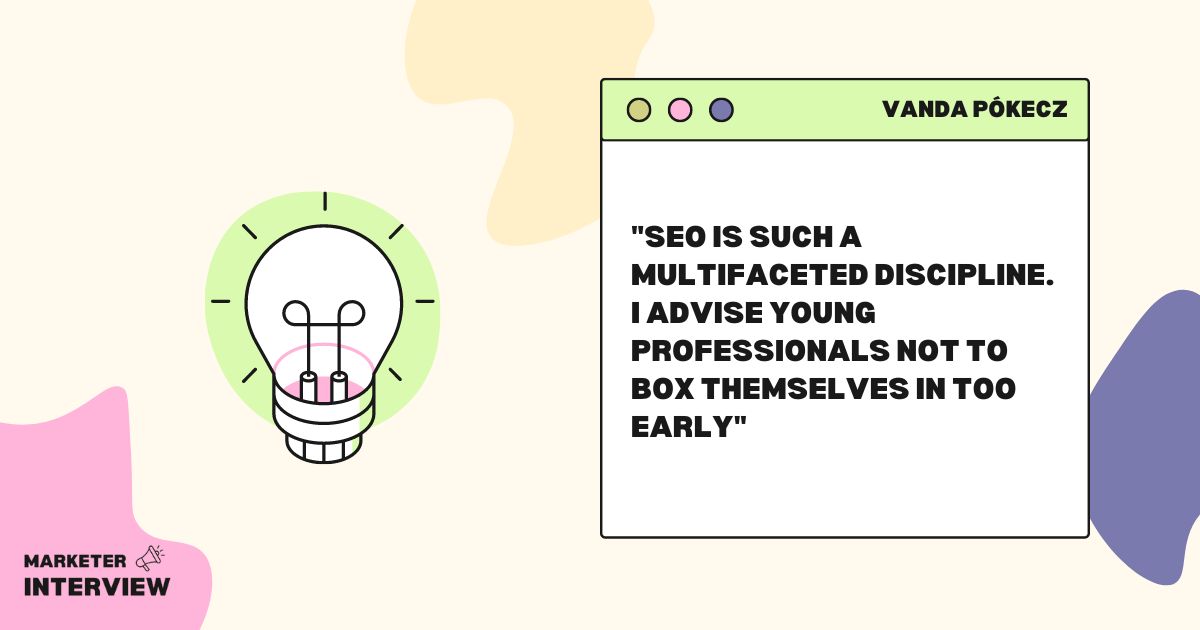
What advice do you have for aspiring SEO professionals or product managers?
SEO is such a multifaceted discipline. I advise young professionals not to box themselves in too early.
Instead, explore the different sides before specializing in one, be that more on the content side, technical SEO, or for that matter, a product management direction.
More than that, I recommend everyone in SEO to take advantage of cross-departmental opportunities, as this will help them learn and build relationships, which might help in the future, especially if they become SEO PMs.
On the note of learning, SEO as a discipline changes all the time, especially nowadays, so if you are just starting your career in SEO, you need to be open to continuous learning!
